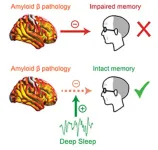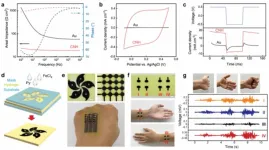(Press-News.org) Genetic testing for hereditary cancers, such as breast, colon, pancreatic, and ovarian cancer, helps at-risk individuals understand their familial risk for these diseases and make informed decisions about next steps in care. But fewer than 20 percent of at-risk patients utilize this testing, and even fewer engage in genetic counseling after referral, often due to clinical workflow challenges or barriers to care.
Amid national efforts to increase access to genetic testing, a new study led by a Boston University School of Public Health researcher has identified a streamlined approach in clinical settings that may help advance these efforts by simplifying the process of identifying hereditary cancer risk and determining subsequent care.
Published in the journal Genetics in Medicine, the study measured patient uptake of genetic testing in clinical practices that implemented a digital cancer risk assessment across different clinical workflow models, including a traditional referral, point-of-care scheduling, point-of-care counseling, and point-of-care genetic testing.
The findings showed that clinical practices that combined a digital cancer risk assessment along with point-of-care testing more than doubled the average uptake of genetic testing. While this streamlined strategy shows promise for cancer prevention and detection, the researchers say more work needs to be done to increase utilization of these valuable services.
“This study is one of the largest to show the possible advantages of a scalable mainstreamed approach to facilitating greater uptake of genetic testing across a variety of clinical settings,” says study lead and corresponding author Dr. Catharine Wang, associate professor of community health sciences at BUSPH. “In spite of this advantage, however, overall testing rates varied widely among sites deploying this approach, suggesting that there is still much room for improvement.”
For the study, Dr. Wang and colleagues from BUSPH and digital healthcare company CancerIQ, Inc. analyzed data among approximately 33,000 high-risk patients (out of more than 100,000 screened) who met genetic testing criteria for breast and ovarian cancer, and/or Lynch syndrome, an inherited disorder that increases risk for many types of cancer. Providers in 27 health centers or primary care/specialty offices conducted a hereditary cancer risk assessment using the CancerIQ digital precision prevention platform that optimizes clinical workflow through a range of automated processes, including gathering data and categorizing patients into different risk tiers, streamlining the genetic counseling and testing process, and creating personalized care plans.
In the traditional referral workflow, patients were referred to a genetic specialist who called to schedule an appointment; with point-of-care scheduling, they scheduled testing with a specialist immediately during their appointment; with point-of care counseling, the patients were offered an immediate consult by with a specialist; and with point-of-care testing, they were offered immediate genetic testing once they were determined to be at risk.
On average, 16 percent of high-risk patients opted for genetic testing overall, from 35 percent of patients at offices that implemented the point-of-care testing workflow, to just 6 percent of patients at offices utilizing the referral process. The point-of-care testing model enables doctors to educate and discuss the testing with patients directly, rather than necessitate an additional pretest appointment with a genetic counselor.
The researchers say further work should address continued challenges with this workflow, such as physicians’ hesitation to order tests or counsel patients, and patients’ concerns about insurance coverage.
“We still have a lot of learn about best practices for increasing access to cancer genetic services, particularly among patients who are medically underserved and face numerous logistical and structural barriers to accessing care,” Dr. Wang says. “Given these current constraints, it is important to examine alternate models of care delivery, and this study suggests that point-of-care testing is an effective delivery model for improving genetic testing outcomes.”
The senior author of the study is Dr. Ziming Xuan, professor of community health sciences at BUSPH. The study was coauthored by Haibo Lu, cofounder and chief data officer of Cancer IQ, and the late Dr. Deborah Bowen, who was a professor in the Department of Bioethics and Humanities at the University of Washington School of Medicine.
**
About Boston University School of Public Health
Founded in 1976, Boston University School of Public Health is one of the top five ranked private schools of public health in the world. It offers master's- and doctoral-level education in public health. The faculty in six departments conduct policy-changing public health research around the world, with the mission of improving the health of populations—especially the disadvantaged, underserved, and vulnerable—locally and globally.
END
Offering genetic testing at the point of care may increase uptake
A new study suggests that combining digital cancer risk assessment with point-of-care genetic testing may help streamline clinical workflow challenges that prevent at-risk patients from accessing this care.
2023-05-04
ELSE PRESS RELEASES FROM THIS DATE:
Early life abuse may be linked to greater risk of adult premature death
2023-05-04
Physical and sexual abuse in childhood and adolescence could be associated with a greater risk of adult premature death (before age 70), finds research published by The BMJ today.
This study extends and refines the existing evidence in this area, and highlights the importance of providing trauma informed care for those who have experienced child abuse, say the researchers.
Early life abuse is a global public health issue because it substantially contributes to child death and a range of long term consequences during adulthood. However, the association of childhood or adolescent abuse with total and cause specific premature death during adulthood ...
New study finds no increased risk of menstrual changes after COVID-19 vaccination
2023-05-04
A Swedish study of nearly 3 million women published by The BMJ today finds no evidence of an increased risk of menstrual changes after covid-19 vaccination.
Weak and inconsistent associations were found between covid-19 vaccination and contact with healthcare for postmenopausal bleeding and were even less consistent for menstrual disturbance and premenstrual bleeding.
These findings do not provide any substantial support for a causal association between covid-19 vaccination and diagnoses related to ...
TSIM introduces online training course for successfully implementing sustainable telehealth services
2023-05-04
The Telehealth Service Implementation Model (TSIM) is set to launch a brand-new online training course for telehealth leaders and teams. TSIM originated at the Medical University of South Carolina (MUSC), stemming from the successful and groundbreaking work of its successful telehealth team. The MUSC Health Center for Telehealth is one of only two federally designated National Telehealth Centers of Excellence in the country.
All-encompassing in nature, TSIM’s structured framework facilitates the development, implementation and optimization of telehealth services. The pioneers of this unique model aimed to share their knowledge and telehealth best practices with other ...
Durham University receives £9m Wellcome award to transform humanities’ contribution to health research
2023-05-04
-With pictures-
Durham University researchers have been awarded the largest grant ever made by the Wellcome Trust for humanities research.
The £9 million award was announced today (4 May 2023) and will fund a new Discovery Research Platform for Medical Humanities (DRP-MH).
The Discovery Research Platform for Medical Humanities will bring the stories and perspectives of people with lived experience of complex health conditions to the forefront of health research.
The Platform will involve people with lived experience and people from marginalised communities as ...
Severe mental illness linked to low attendance at cancer screening
2023-05-04
People with severe mental illness are less likely to attend cancer screening compared to those who do not have such conditions, according to new research from the University of Surrey and the Office for Health Improvement and Disparities (OHID) at the Department of Health and Social Care.
Funded by OHID and NHS England, with support from Cancer Research UK, the study found disparity in attendance at cancer screening in people with severe mental illness, with the most pronounced disparities being observed for those diagnosed with schizophrenia, followed by those diagnosed with other psychoses and bipolar disorder.
The ...
Deep sleep may mitigate Alzheimer’s memory loss, Berkeley research shows
2023-05-04
A deep slumber might help buffer against memory loss for older adults facing a heightened burden of Alzheimer’s disease, new research from the University of California, Berkeley, suggests.
Deep sleep, also known as non-REM slow-wave sleep, can act as a “cognitive reserve factor” that may increase resilience against a protein in the brain called beta-amyloid that is linked to memory loss caused by dementia. Disrupted sleep has previously been associated with faster accumulation of beta-amyloid protein in the brain. However, the new ...
HKU Mechanical Engineering team develops electroconductive hydrogel for biomedical applications
2023-05-04
Synthetic hydrogels show great promise in tissue repair, drug delivery, medical implants, and many other applications. Hydrogels functionalized with electrically conductive components can be used in bioelectronic devices for cardiac or neural interfaces, for applications such as neural prosthetics, cardiac patches, and electronic skin.
A research team led by Dr Lizhi Xu of the Department of Mechanical Engineering in the Faculty of Engineering at the University of Hong Kong (HKU) has recently developed a new type of electroconductive hydrogels with outstanding mechanical strength and manufacturability, creating ...
New guidance: antibiotics should be halted upon closure of incisions
2023-05-04
ARLINGTON, Va. (May 4, 2023) — Antibiotics administered before and during surgery should be discontinued immediately after a patient’s incision is closed, according to updated recommendations for preventing surgical site infections. Experts found no evidence that continuing antibiotics after a patient’s incision has been closed, even if it has drains, prevents surgical site infections. Continuing antibiotics does increase the patient’s risk of C. difficile infection, which causes severe diarrhea, and ...
Red flags indicate risk for early-onset colorectal cancer
2023-05-04
Researchers at Washington University School of Medicine in St. Louis have identified four important signs and symptoms that signal an elevated risk of early-onset colorectal cancer. These red flags may be key to earlier detection and diagnosis of early-onset colorectal cancer among younger adults. The number of young adults with colorectal cancer has nearly doubled in recent years.
Studying de-identified health insurance data on more than 5,000 patients with early-onset colorectal cancer — cancer that occurs before a person turns 50 — the researchers found that in the period between ...
Reviving exhausted T cells to tackle immunotherapy-resistant cancers
2023-05-04
LA JOLLA, CALIF. – May 03, 2023 – When the cells of our immune system are under constant stress due to cancer or other chronic diseases, the T cells of the immune system shut down in a process called T cell exhaustion. Without active T cells, which kill tumor cells, it’s impossible for our bodies to fight back against cancer. One of the biggest goals of immunotherapy is to reverse T cell exhaustion to boost the immune system’s ability to destroy cancerous cells.
Researchers at Sanford Burnham Prebys studying melanoma have found a new way to make this ...
LAST 30 PRESS RELEASES:
Trapping light on thermal photodetectors shatters speed records
New review highlights the future of tubular solid oxide fuel cells for clean energy systems
Pig farm ammonia pollution may indirectly accelerate climate warming, new study finds
Modified biochar helps compost retain nitrogen and build richer soil organic matter
First gene regulation clinical trials for epilepsy show promising results
Life-changing drug identified for children with rare epilepsy
Husker researchers collaborate to explore fear of spiders
Mayo Clinic researchers discover hidden brain map that may improve epilepsy care
NYCST announces Round 2 Awards for space technology projects
How the Dobbs decision and abortion restrictions changed where medical students apply to residency programs
Microwave frying can help lower oil content for healthier French fries
In MS, wearable sensors may help identify people at risk of worsening disability
Study: Football associated with nearly one in five brain injuries in youth sports
Machine-learning immune-system analysis study may hold clues to personalized medicine
A promising potential therapeutic strategy for Rett syndrome
How time changes impact public sentiment in the U.S.
Analysis of charred food in pot reveals that prehistoric Europeans had surprisingly complex cuisines
As a whole, LGB+ workers in the NHS do not experience pay gaps compared to their heterosexual colleagues
How cocaine rewires the brain to drive relapse
Mosquito monitoring through sound - implications for AI species recognition
UCLA researchers engineer CAR-T cells to target hard-to-treat solid tumors
New study reveals asynchronous land–ocean responses to ancient ocean anoxia
Ctenophore research points to earlier origins of brain-like structures
Tibet ASγ experiment sheds new light on cosmic rays acceleration and propagation in Milky Way
AI-based liquid biopsy may detect liver fibrosis, cirrhosis and chronic disease signals
Hope for Rett syndrome: New research may unlock treatment pathway for rare disorder with no cure
How some skills become second nature
SFU study sheds light on clotting risks for female astronauts
UC Irvine chemists shed light on how age-related cataracts may begin
Machine learning reveals Raman signatures of liquid-like ion conduction in solid electrolytes
[Press-News.org] Offering genetic testing at the point of care may increase uptakeA new study suggests that combining digital cancer risk assessment with point-of-care genetic testing may help streamline clinical workflow challenges that prevent at-risk patients from accessing this care.




